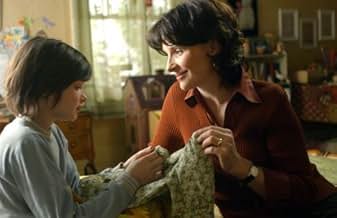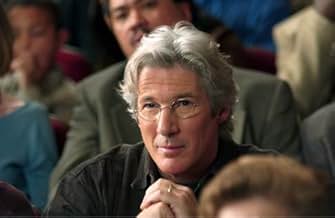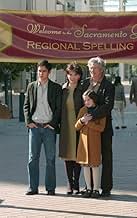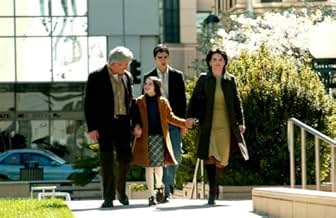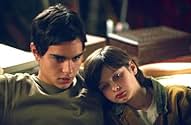Richard Gere è il protagonista di questa storia avvincente che parla di un padre ossessionato dal preparare la figlia talentuosa per il Torneo Nazionale di Spelling.Richard Gere è il protagonista di questa storia avvincente che parla di un padre ossessionato dal preparare la figlia talentuosa per il Torneo Nazionale di Spelling.Richard Gere è il protagonista di questa storia avvincente che parla di un padre ossessionato dal preparare la figlia talentuosa per il Torneo Nazionale di Spelling.
- Regia
- Sceneggiatura
- Star
- Premi
- 1 candidatura in totale
Recensioni in evidenza
The film blends a family drama with two popular interests, the Kabbalah and spelling bees. Unfortunately, the gimmicky celebrity populism of the former is accentuated with the wincible casting of Richard Gere as the father who is supposed to be a Talmudic scholar with a dissertation on Jewish mysticism.
When he was shown giving a simplistic lecture at multicultural UC Berkeley on the theme of tikkun olam (repairing the world) that is echoed throughout the film, I felt the only way I could accept him in the role at all would be to assume he was a gentile intro to comparative religion teacher, even though he has lines denigrating Jews who chant Hebrew in synagogue without understanding the language and about inspiring his French Catholic wife to convert. He does put across well how the patriarch bullies the family emotionally and controls them with food, rigid standards and attention, like a more subtle Great Santini, but he lacks the pale intensity of the obsessed and just seems another NPR-listening, Bach-duet playing intellectual.
Until the involving climax, though, there are ironically very little Hebrew numbers as letters to guide the secrets of the universe in the movie when the dad takes his spelling wunderkind daughter under his wing to teach her the power of language, but it does lead to the most powerful scenes in the film of letting us see what's going on inside her head. Flora Cross in her debut is the anti-Dakota Fanning in absolutely convincing us that she is in thrall to a supernatural gift and that her kabbalistic studies, which are usually forbidden to young people for their psychological dangers, are opening her up to hidden reservoirs of perception. It is completely exceptional that special effects can be so extraordinary and important to an intellectual family story, but they are not only enchanting but demonstrative. Cross naturally communicates how she intuitively is in touch with a force that her father can only enthusiastically theorize and not quite capture himself.
The sharp editing is superb at clarifying cross-currents from the book, and perhaps making it much easier, perhaps a bit too simplistically, to see how each member of the family is seeking the face of God in their own way. The son, dark heart throb in the budding Max Minghella, is, as usual, seduced by a bland blonde shiksa, Kate Bosworth, though with an unusual rebellious religious twist that here seems natural to the Berkeley environment. But then his Jewish religious education seemed pretty random.
The editing and the special effects also marvelously contrast the paternal theme with the other fractured visual theme of the kaleidescope that the mother favors. While Naomi Foner Gyllenhaal's adaptation (and it's nice to see Maggie and Jake's mom's work again) makes the details of the mom's increasingly disturbed activities more incomprehensible than in the book, Juliette Binoche superbly adds a fragility and depth to the role beyond the novel and makes her heartbreakingly sympathetic.
The conclusion is more emotional, if more pat, than in the book, though some interpretation is still possible.
In making the intellectual visible, the film also uses library settings as an inner sanctum very warmly.
Nice to hear the band Ivy on the soundtrack and over the credits.
The movie moves too fast, though I can understand because of time limit, to actually give the viewers the concepts that the book gives. A lot of details and events are cut from the book that is important to the story as a whole. The script seems undeveloped, and the actors/actresses carried out their character with mediocre performances.
Saul (Richard Gere) is somewhat true to his character. The only thing he is obsessed with is to enable Eliza to communicate with God. He does this in a way that is the most true to novel.
Aaron's (Max Minghella) appearance is very different from that described in the book. He is described as a pale and scrawny young man, who is incapable of getting dates and is a social outcast. His search for a new religion seems unreasonable and spontaneous in the movie, and I thought it didn't really capture his true character.
Miriam's (Julliete) kleptomania is weird in both the book and the movie. Her actions in the book seems more reasonable when I knew her purposes for doing it. In the movie I thought it was a very random thing for her to do.
Eliza (Flora Cross) is a young actress, and is limited to what she can do. Her acting is very mediocre at best, and does not convince me of Eliza that is in the novel.
Chali, which I am surprised to see, have been transformed from a middle-aged man into a young blond girl. I can understand why they did that, but that just adds to the falseness of Aaron's character.
Overall I think the movie is an average depiction of Bee Season. I can't say that they did a nice job of sticking to the plot. It's almost impossible to transform a novel into a movie with everything in the book.
This movie is powerful because it details, much more authentically than films like "Ordinary People" and "American Beauty", the way a family can start out with the hopes of happiness and the grasp toward achievement, community, and fulfillment, but end up discovering what, alas, we all discover eventually- that our need for control and refinement and altering others' lives often leads to ours and their unhappiness. "Bee Season" also evokes the need of God in our lives- in whatever way we define that, whether it be religious community, personal spirituality, or deep connections to others. Mostly, the message of this film seems to be that spirituality, as Saul defines it, often disconnects and alienates, rather than connects and fulfills. Oftentimes the little embraces and big love we give to our families and friends on a day-to-day basis constitute divinity in our lives.
A+...Powerful...You don't want to miss it.
Lo sapevi?
- QuizDakota Fanning was originally supposed to play Eliza, but directors selected Flora Cross because she looked so much more like Juliette Binoche.
- BlooperThe license plates on the family Volvo are different on the front and back. The front license plate starts with a "4", the rear license plate starts with a "5".
- Citazioni
Saul: There are people who believe that letters are an expression of a very special primal energy and when they combine to make words they hold all the secrets of the universe...
Saul: Remember the Vikings?
Saul: [Takes a green apple] OK, Vikings called this "aepli".
Saul: Now when they took it across the sea in their ships it became "apfel".
Saul: Crossed another border, it became "appel".
Saul: By the time it got to us it was "apple".
Saul: Its spelling contains all of that.
Saul: It holds its history inside it.
- ConnessioniFeatured in At the Movies: Episodio #2.41 (2005)
- Colonne sonorePartita in B Minor BWV 1002 Sarabande
Written by Johann Sebastian Bach
Arranged by Peter Nashel and Patrick Zimmerli
Performed by Tim Fain and Inbal Segev
I più visti
- How long is Bee Season?Powered by Alexa
Dettagli
- Data di uscita
- Paesi di origine
- Sito ufficiale
- Lingue
- Celebre anche come
- Bee Season
- Luoghi delle riprese
- Aziende produttrici
- Vedi altri crediti dell’azienda su IMDbPro
Botteghino
- Budget
- 14.000.000 USD (previsto)
- Lordo Stati Uniti e Canada
- 1.180.560 USD
- Fine settimana di apertura Stati Uniti e Canada
- 120.544 USD
- 13 nov 2005
- Lordo in tutto il mondo
- 6.856.989 USD
- Tempo di esecuzione
- 1h 44min(104 min)
- Colore
- Mix di suoni
- Proporzioni
- 2.35 : 1








